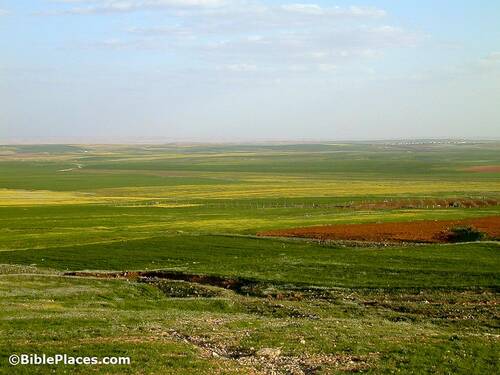Matot-Masei: What Kind of Promised Land will You Create?
07/25/2022 09:23:19 AM

The Plains of Moab, across from the Jordan
This week's Torah portion is a doozy- the longest in the Torah. 122 Verses.
The first portion contains the laws of vows, oaths and contracts. Aha... now we get it! Those contracts... pages and pages, clauses and clauses. And then lawsuits... No wonder! But only a system of laws and covenants can create a society that, in the words of political philosopher Thomas Hobbes, is not a situation of bellum contra omnes- a war of everyone against everyone.
But Jewish society, any society, cannot only be created out of laws. After the legal section comes something else:
A list of all of the 42 encampments of the journey from Sukkoth, the first stop out of Egypt all the way to the Plains of Moab. Forty years of voyages, adventures, towering triumphs and heart wrenching failures.
And all together.
Crossing the Sea of Reeds and seeing the Egyptians finally face justice for their genocide against us and our children. Standing at Sinai, failure through the Golden Calf. Buildng the Mishkan, the Tabernacle and learning that G-d is with us always. The Mannah, the Water from the Rock. The attack of Amalek. The generation that rejected the Land of Israel and the forty years of wandering. The triumphs against the Emorites and Midianites who sought to destroy us. The heresy of Ba'al Pe'or and near disaster and now... here we are.
And only then, after recounting all of that shared journey does the Book of Numbers and really the Torah itself conclude: These are the Mitzvot and the judgments that HaShem enjoined Israel through Moshe on the steppes of Moab across the Jordan from Jericho.
Shared experiences, shared history, shared destiny, a shared vision. That is the other half of what is necessary for a society to exist.
In other words, our ticket to the Promised Land was a durable social contract. Laws without a sense of common purpose creates a litigious society constantly bickering and vying for dominance. But a sense of identity without laws creates a tribalism that has no moral limits. Only when elements exist together and strengthen each other: when law strengthens the mission-statement of the nation and when the identity of the nation celebrates justice can Jewish society, or any society, endure and serve its ultimate purpose: empowering each individual to live up to their full potential for good, celebrating the presence of G-d in every person and in every community dedicated to the life-giving values of compassion, justice, freedom and peace.
At the borders of the Promised Land, the Torah narrative comes to an end as if asking each of us: what kind of Promised Land will you create?
Shabbat Shalom
